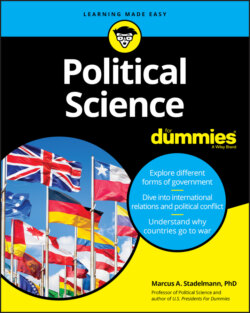Читать книгу Political Science For Dummies - Marcus A. Stadelmann - Страница 80
Moving from Materialist to Postmaterialist
ОглавлениеThe concepts of materialism and postmaterialism have been used by the discipline of economics for decades. Recently the two concepts have been adapted by political science to show how the shift from a materialist society to a postmaterialist society can change the political culture of a country and subsequently the politics in a country.
In a materialist society, people are trying to fulfill their basic needs. Basic needs include food, shelter, and ways to get to work and take care of the family. People in materialist societies are mostly concerned with economic security, they tend to be deeply religious, and issues such as law and order matter to them.
After several decades of economic growth, a materialist society evolves into a postmaterialist society. Suddenly, basic economic needs of citizens have been met, and society now is less concerned with economic survival and has money left over to spend on more than just basic needs. The issues society is concerned about also change. Instead of economic security, people now focus on individual freedoms, social equality, and overall quality-of-life issues.
This shift from a materialist society to a postmaterialist society redefines politics in a country. The following changes can be detected:
Religion loses importance in society. Fewer and fewer people attend church services and are willing to base their vote on religious issues.
Union membership declines. With society doing well economically, there’s less of a need for unions and fewer and fewer people are willing to join. In turn, unions are getting weaker in the political realm.
Social class becomes less important in politics. Most of the citizens in a postmaterialist country consider themselves middle class, and class distinctions cease to be of importance.
New issues become important to the public. With people having less to worry about economic security, they can now focus on other issues of importance. These issue include a worry about the environment and social equality. Green movements are born, and issues such as gender equality and gay rights come to the forefront.
People demand more direct democracy. With a society becoming not only more prosperous but also more educated, people want change. They now call for the use of referenda and initiatives to allow for the people to be more involved in policy making.
A more educated electorate is less willing to base its vote on straight political party line. Instead, ticket-splitting becomes commonplace. The whole political process now becomes personal. With people voting less for the party than for the candidate, politics becomes personalized and image driven. People vote for candidates and not a political party anymore. Suddenly, a candidate’s image becomes paramount, and party issue stances matter less.
